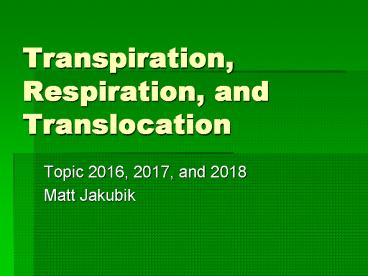Transpiration, Respiration, and Translocation - PowerPoint PPT Presentation
1 / 18
Title:
Transpiration, Respiration, and Translocation
Description:
Transpiration, Respiration, and Translocation Topic 2016, 2017, and 2018 Matt Jakubik Transpiration Transpiration- loss of water vapor from the plant Water diffuses ... – PowerPoint PPT presentation
Number of Views:483
Avg rating:3.0/5.0
Title: Transpiration, Respiration, and Translocation
1
Transpiration, Respiration, and Translocation
- Topic 2016, 2017, and 2018
- Matt Jakubik
2
Transpiration
- Transpiration- loss of water vapor from the plant
- Water diffuses out of the plant from a 100
concentration in leaves to an area of low
concentration
3
Transpiration
- Water exits the leaves through openings in the
leaves through stomata
4
Factors Affecting Transpiration
- Temperature
- Humidity
- Air Currents
- CO2
- Soil Water Availability
5
Air Currents Affect Transpiration
- Wind removes water vapor that is in the area
immediate to the plant. - This removal of water vapor decreases the water
potential of the air in that area. - Since water moves from higher to lower potential
areas, the decrease in potential increases the
rate of transpiration
6
Affects of CO2 on Transpiration
- If carbon dioxide concentration in the air
increases, the plant will have its stomata open
less. - With the stomata open less, the amount of
transpiration decreases.
7
Soil Water Availability
- As soil water availability increases, the plant
will have more excess water to move through the
plant. - Therefore, increasing water availability in the
soil will increase the rate of transpiration.
8
Transpiration
- 95 of water is lost through the stomata
- 3-5 is lost through the leaf cuticle
- A corn plant will transpire up to 4 quarts of
water per day
9
Respiration
- The plant breathing
- When
- At all times day and night
- Done for energy purposes
10
Three Types of Respiration
- Aerobic Respiration- when oxygen is adequate
- Anaerobic Respiration- when oxygen is low
- Photorespiration- occurs only in chloroplasts
- Plants get no usable energy from it
- C4 plants very little photorespiration so plants
can accumulate more dry matter
11
(No Transcript)
12
Translocation
- Transports water in the xylem
- Transports food and minerals in the phloem
13
http//www.botany.hawaii.edu/faculty/webb/BOT410/X
ylem/Xylem-1.htm
14
Phloem Cells
Xylem Cells
http//www.botany.hawaii.edu/faculty/webb/BOT410/X
ylem/Xylem-1.htm
15
http//www2.cdepot.net/walser/worldofscience/Biol
ogy/Pictorial20Help/Botany/diagram_layers_conif.h
tm
16
Translocation
- Source is the location where food is produced
(photosynthesizing leaves or storage tissue) - Sink is the location where all plant parts are
unable to meet their own nutritional needs (roots
and stems)
17
Source
Sink
http//www.bit.net.au/peterrjo/plants.html
18
Water Potential and Osmosis
- Osmosis is the diffusion of water across
membrane. - Water potential is the potential energy of water































